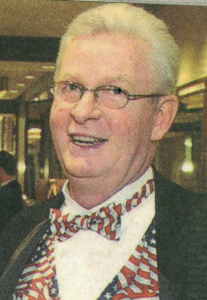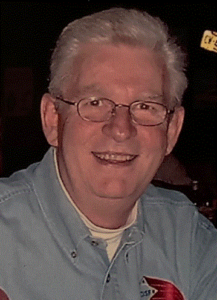By: Roy E. Cox, Jr., D.Ed., EMT-P & Jenifer A. Swab, Ph.D., EMT-P
 Richard T. Boland, Founding Member of the Pittsburgh Critical Incident Stress Management Team began his public safety career with the City of Pittsburgh in 1975. After serving in the military during the Vietnam War, he was hired in one of the first group of paramedics in the Department of Emergency Medical Services in Pittsburgh. In the beginning of his career, Rich astutely noted the stress effects of the job on first responders. Like many EMS workers in this newly formed profession, Rich recognized the need for some type of stress management. It was Rich who sought out Critical Incident Stress Debriefing in the early 1980s and introduced this model to public safety officials in the City of Pittsburgh.
Richard T. Boland, Founding Member of the Pittsburgh Critical Incident Stress Management Team began his public safety career with the City of Pittsburgh in 1975. After serving in the military during the Vietnam War, he was hired in one of the first group of paramedics in the Department of Emergency Medical Services in Pittsburgh. In the beginning of his career, Rich astutely noted the stress effects of the job on first responders. Like many EMS workers in this newly formed profession, Rich recognized the need for some type of stress management. It was Rich who sought out Critical Incident Stress Debriefing in the early 1980s and introduced this model to public safety officials in the City of Pittsburgh.
Rich collaborated with Dr. Carol Anderson, Ph.D., clinician, and administrator at Western Psychiatric Hospital in Pittsburgh and the two of them began to develop Pittsburgh CISM. They collaborated with Pittsburgh’s regional EMS agency to bring Dr. Jeff Mitchell, Ph.D. from the International Critical Incident Stress Foundation (ICISF) to Pittsburgh (S. Roth, personal communication, November 15, 2020). Dr. Mitchell trained key members of public safety and behavioral health. As with any new concept, there was much work to do to educate the community of mental health professionals about CISM and to convince public safety leaders that there was a process that could help first responders deal with the atrocities of their jobs. During this groundwork, several critical incidents occurred in Pittsburgh which provided an opportunity to put CISM to work.
The first major incident that utilized CISM occurred in May of 1986 when a 500-year storm led to flash flooding in several communities just north of the Pittsburgh. Seven people were killed, and hundreds were displaced from their homes. “Rescuers searched for more victims after heavy thunderstorms triggered flash floods and mudslides that stranded hundreds of people, some who were evacuated in boats and helicopter” (Bradley-Steck, 1986). The county EMS manager, Dan Fitzhenry, recognized the emotional challenges that EMS, police, and fire personnel were dealing with. They had waded through waist high water on the first night and then in the coming days, searching miles of creek beds and homes, looking for survivors and bodies. He recalled chatting with a firefighter/paramedic who was shoveling mud. This firefighter spoke of a nightmare that was so evocative it motivated Dan to reach out to Rich Bolan for help…and the first “formal” debriefing for a large scale event was organized (D. Fitzhenry, personal communication, November 5, 2020).
The debriefing for the flood was attended by dozens of first responders, many of whom were still in their working clothes when they arrived― helmets donned, gloves hanging out of their pockets, and mud on their boots, clothes, and faces. They were the epitome of responders working hard at a critical incident. Some reported that they didn’t really want to come to the debriefing and would rather have remained on the job but were urged by their department chiefs. The group of responders was so large that the debriefing team split them into smaller groups in order to provide the best platform for participation while maintaining homogeneity (J. Swab, personal communication, August 22, 2018).
The CISM debriefers became witness to the gravity of the situation through the stories of the responders. CISM provided the platform needed that allowed these professionals to talk while reassuring them that their reactions to the stress were normal.
And so, it began: CISM would begin to take off in the City of Pittsburgh and immediate surrounding areas.
In the coming years, the groundwork of Pittsburgh CISM began to take shape. It wasn’t for the challenges of motor vehicle fatalities, floods, fires, pediatric deaths, multi-casualty incidents─ rather the challenges were in building, educating, and promoting this new concept to public safety leaders and mental health professionals to earn their acceptance. Pittsburgh had its work cut out for it, but under the direction of Rich and with the help of the Dr. Jeff Mitchell and Dr. George Everly of ICISF in Maryland, the team quickly catapulted into success and became the first CISM Team in Pennsylvania and eventually, one of the busiest. During these early years in the 1980s and 1990s, Rich was instrumental in the development of other CISM teams across the state.
 As the Pittsburgh CISM Team formed, Mr. Boland was appointed as the Operations Director. In addition, he was the Chair of CISM on the Pennsylvania Emergency Health Services Council (PEHSC), and organization that represents the voice of EMS in PA and reports to the state’s governing agencies. PEHSC assisted in coordinating a statewide CISM structure. Rich was a pillar in recruiting members to be a part of Pittsburgh CISM who responded to multiple disasters in the City, Allegheny County, and Western Pennsylvania. His dedication was incessant, and he would stop at nothing, propelling Pittsburgh’s Team into the busiest in the State of PA (M. Scott, personal communication, October 20, 2020).
As the Pittsburgh CISM Team formed, Mr. Boland was appointed as the Operations Director. In addition, he was the Chair of CISM on the Pennsylvania Emergency Health Services Council (PEHSC), and organization that represents the voice of EMS in PA and reports to the state’s governing agencies. PEHSC assisted in coordinating a statewide CISM structure. Rich was a pillar in recruiting members to be a part of Pittsburgh CISM who responded to multiple disasters in the City, Allegheny County, and Western Pennsylvania. His dedication was incessant, and he would stop at nothing, propelling Pittsburgh’s Team into the busiest in the State of PA (M. Scott, personal communication, October 20, 2020).
Rich coordinated CISM responses for dozens of incidents, including a response for a tragic Formula One racing speedboat accident that occurred during a yearly regatta in Pittsburgh. Early in the race, one of the speedboats veered out of control and landed on the crowded riverbanks where thousands of spectators had gathered. Two dozen people were injured, eight of them critical, and nearly half of them children (“Racing Boat Hits Spectators”, 1988).
On September 8, 1994, USAIR Flight 427 disaster crashed in a heavily wooded and mountainous area in Beaver County, about an hour North of Pittsburgh. Witnesses state the plane went down in a ball of fire, killing all 132 passengers and crew on board (“Behind the Nightmare”, 1994). Rich coordinated and responded with Pittsburgh CISM to the needs of those who had the arduous task of recovering the bodies. CISM personnel worked tirelessly for days and had set up a “rest” station near the crash scene where responders could go and start to talk about their experience, or simply just rest (M. Scott, personal communication, October 20, 2020).
Rich Boland was a faithful presence at countless critical events. He coordinated Pennsylvania’s CISM response to the tragic events of 9-11. Most notably was his coordination for the crash of United Airlines Flight 93, whose fate would end in an open field in Somerset County, Pennsylvania killing all 40 passengers and crew on board and the four hijackers. Rich as the Operations Director and Peggy Kearney, Clinical Director, traveled to the crash site to conduct CISM (P. Kearney, personal communication, November 16, 2020).
On Saturday, March 13, 2004, as many Pittsburghers were attending one of the largest St. Patrick’s Day Parades in the country, Pittsburgh Fire, Police, and EMS were at the scene of a church fire in the Hill District area of the Pittsburgh. The expansive stone church would ultimately collapse, trapping and injuring multiple firefighters. Public safety officials and other responders left the parade to help. As the minutes grew into hours and the day wore on, a somber presence blanketed the scene. Six hours after the collapse, all of the firefighters had been accounted for: 31 firefighters were injured, some of them critically and who never returned to work, and two who had perished in the collapse (LaRussa,”Pastor, Firefighters Reflect”, 2009).
Other line of duty deaths of first responders that Rich coordinated CISM responses for include Friday, September 22, 1995, when a Pittsburgh Cycle Police officer was killed by gunfire. On Wednesday, March 6, 1991, two police officers were killed in a vehicular pursuit. Not only did Rich direct CISM responses, but he also participated in many of the interventions, big and small, including the incidents that never get any media attention and can be considered everyday constructs of the job (R. Cox, personal communication, October 20, 2020).
Today, Pittsburgh CISM consists of 75 team members representing the professions of: EMS, police, 9-1-1 telecommunicators, and fire peers; social workers, nurses, therapists, counselors, psychologists, employee assistance program and industry experts; members of the clergy, and therapy dogs. Pittsburgh CISM is one of the largest Teams in the state of Pennsylvania and responds to an average of four to six calls a month.
Throughout all of his tireless efforts, Rich Boland helped countless of public safety personnel manage the stress and emotions resulting from horrific incidents they would be exposed to on the job. Rich and the Pittsburgh CISM Team developed a strong relationship with ICISF, Dr. Mitchell, and Dr. Everly while promoting CISM education. Pittsburgh began to host ICISF’s international conferences, bringing dozens of expert speakers and guests from across the globe to our region and to this day, such pursuits continue.
It is no wonder that for all of his efforts, Rich was appropriately dubbed The Helper’s Helper.
Richard T. Boland, Founding Member of the Pittsburgh Critical Incident Stress Management Team, lost his battle with cancer on September 24, 2020. Mr. Boland was 70 and is survived by his wife of 45 years, three children, their spouses, 11 grandchildren, other family members, and many, many friends and colleagues. Rich Boland’s dedication to CISM and helping the helpers will be carried on through the Richard T. Boland Scholarship, established by Pittsburgh CISM and awarded to team members who illustrate outstanding dedication to CISM, just the same as Rich did. It is the hope of Pittsburgh CISM that through this scholarship, we can continue to cultivate CISM education and foster continued stress management growth in Rich’s name and through his legacy.
Rich’s knowledge and passion will be hard to replace and The Pittsburgh CISM Team is grateful to Rich and to his family for sharing him with us.
References:
“Behind the Nightmare of US air flight 427.” CTV National News, October 25, 1994. (1994, Oct 25).
Bradley-Steck, Tara. “Seven Die in Flash Floods in Pittsburgh Suburb.” Associated Press, May 31, 1986.
LaRussa, Tony. “Pastor, Firefighters Reflect on Anniversary of Hill District Church Fire.” Tribune Business News, March 14, 2009.
“Racing Boat Hits Spectators in Pittsburgh; 24 Hurt.” New York Times, August 8, 1988.